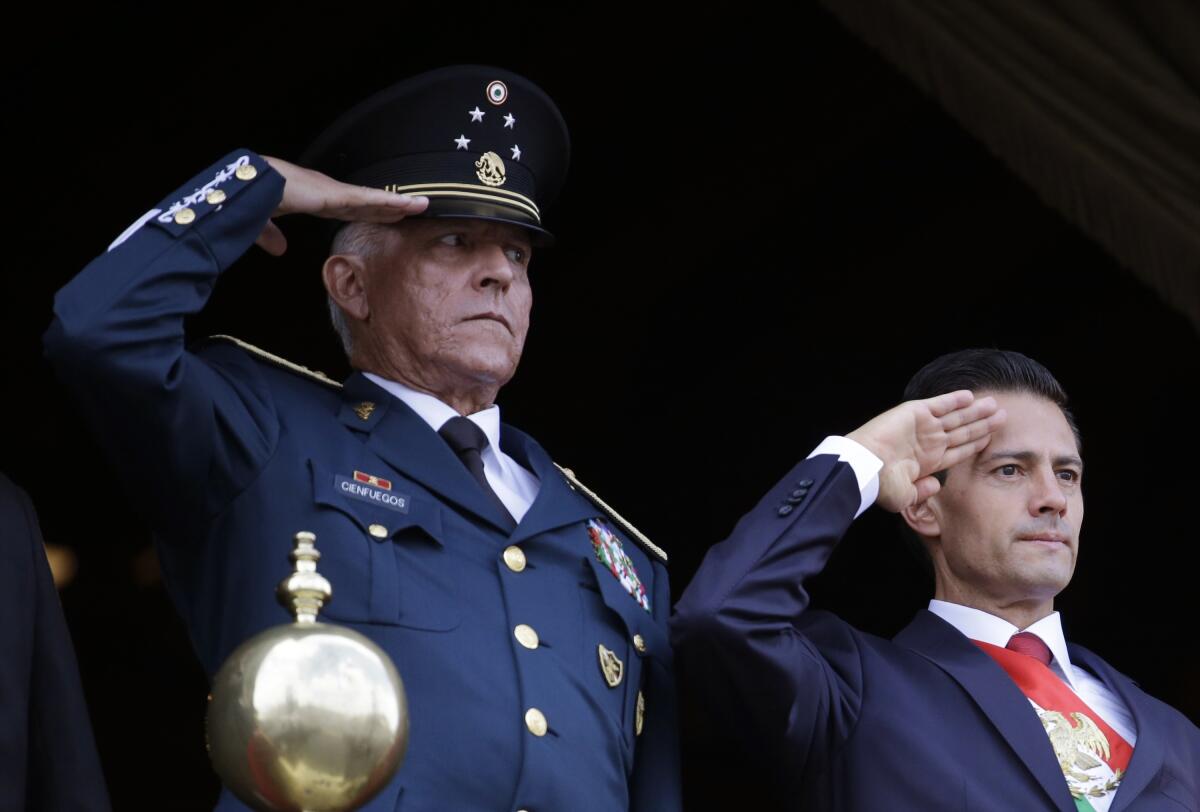Mexico says it wants its ex-officials tried in Mexico

- Share via
MEXICO CITY — Mexico’s foreign secretary said Thursday that the country no longer wants officials accused of corruption to be put on trial in the United States, a move that could scale back a tradition that saw most of Mexico’s corruption cases tried north of the border.
However, a spokesman for Mexico’s President Andrés Manuel López Obrador said the country was still willing to extradite officials or drug traffickers, walking back an earlier statement by Foreign Secretary Marcelo Ebrard.
The flurry of exchanges came a day after the U.S. agreed to drop a high-profile drug trafficking and money laundering case against a former Mexican defense secretary, whose arrest in Los Angeles last month enraged Mexico.
Presidential spokesman Jesús Ramírez told the Associated Press that extradition and other cooperation treaties between the U.S. and Mexico would be maintained, but the country wants formal information sharing and extradition processes.
“What we don’t want are surprise actions,” Ramírez said, in an apparent reference to retired Gen. Salvador Cienfuegos and other former officials who have been arrested while traveling to the United States.
Regarding drug traffickers and others whose crimes affect the United States, Ramírez said “that justifies them being tried in the United States.”
His comments clarified a blanket declaration by Ebrard earlier Thursday that “whoever is culpable according to our laws will be tried, judged and, if applicable, sentenced in Mexico, and not in other countries.”
Ebrard also suggested that the agreement that led to the release of Cienfuegos was broader than previously known.
In response to Ebrard’s comments, a U.S. Justice Department official said no new agreements had been reached between the two countries. The official could not publicly discuss the details of private diplomatic conversations and spoke to the Associated Press on condition of anonymity.
Roberto Velasco, Mexico’s director general of North American affairs, said that generally, crimes in Mexico would be investigated and prosecuted in the country. “As far as transnational crimes that involve both countries or third parties, both governments will continue to share information and available evidence, to determine how to proceed in specific cases,” he said.
The dramatic developments come at an uncertain time in the United States after the recent presidential election. Former Vice President Joe Biden won the election, but President Trump is contesting the outcome and has not allowed his administration to cooperate with a transition or provide briefings to Biden about foreign matters.
Cienfuegos, 72, was secretly indicted by a federal grand jury in New York in 2019. He was accused of conspiring with the H-2 cartel in Mexico to smuggle thousands of pounds of cocaine, heroin, methamphetamine and marijuana while he was defense secretary from 2012 to 2018.
Prosecutors said intercepted messages showed that Cienfuegos accepted bribes in exchange for ensuring the military did not take action against the cartel and that operations were initiated against its rivals. He was also accused of introducing cartel leaders to other corrupt Mexican officials.
On Tuesday, the Department of Justice requested that the drug trafficking and money laundering charges against Cienfuegos be dismissed and that he be returned to Mexico in the interest of maintaining cross-border cooperation. That decision came after reports that Mexico had threatened to expel the Drug Enforcement Administration’s regional director and agents.
More to Read
Sign up for Essential California
The most important California stories and recommendations in your inbox every morning.
You may occasionally receive promotional content from the Los Angeles Times.










